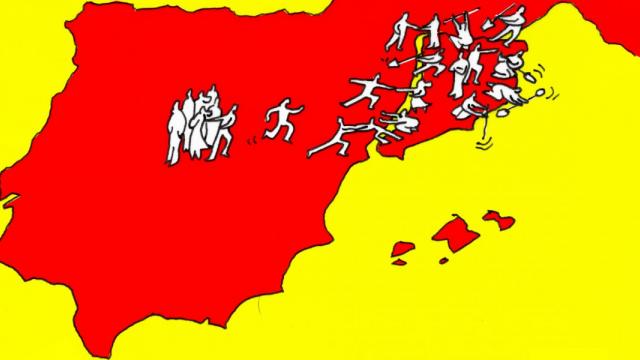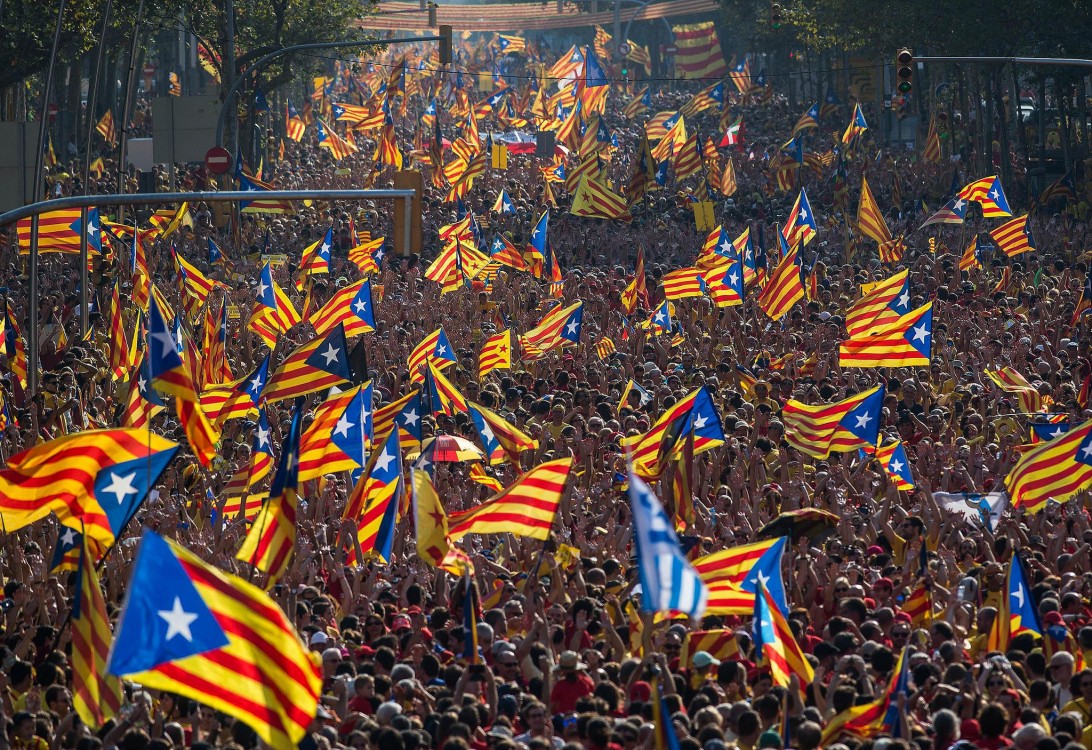
At 9am at Girona's old train station building, doors open. Voting begins. A crowd of hundreds cheer “Votarem”: “We will vote!”
Girona is less than an hour's train's journey north of Barcelona, and people here have stayed up the whole night to guard the polling station from the Guardia Civil, Spain's paramilitary police, who have been ordered to crush the democratic process the Catalan Parliament initiated. Many others arrived at 5am.\
Organizing community by community, the Catalan people have showed a remarkable resolution and determination to hold their referendum. The mood is calm, a positive scene repeated at other polling stations I later see. This tranquillity is often neglected in the violent images that dominate news broadcasts around the world covering Sunday's vote.
In fact, violence from Spanish state police is not far away. Before 10am, I receive a message from one of the citizens helping organize the vote: “Come to the school Bruguera, Guardia Civil are trying to storm the building, they have broken someone's arm. There is a lot of violence. They are kicking down the door,” it reads.
By the time I get there the violence is over. Paramedics are treating injuries. A photographer shows me what happened. In one image, a heavily armoured riot cop is seen carrying away a ballot box.
At another nearby polling station at Eiximenis School, an old woman is clearly shaken. She shows me her glasses, broken by the police. The school stands at the edge of Girona's Constitution Square, where hundreds of people have amassed. Tensions increase when a convoy of nine armoured Guardia Civil vans drive by. But the old woman is not giving up. Her generation survived General Franco, she says.
The riot vans leave and calm returns. People who came from other polling stations that were shuttered form a queue to vote here. Old people are clapped in to vote first; they are said to go early for their own protection. The Guardia Civil are expected to try to steal the ballots with heavy violence later in the day. It is evident to everyone: the paramilitary's barrage is relentless.
The Day Madrid Lost its Legitimacy Over Catalonia
By now, videos have gone viral globally, showing Guardia Civil and Spain's national police force shooting rubber bullets, unleashing tear gas, battering and kicking and sexually assaulting Catalans just for attempting to vote. Over 800 citizens were injured on Sunday.
Following the violence, Spanish Prime Minister Mariano Rajoy denied the referendum had happened and praised his state forces. “We have done what was required of us. We have acted, as I have said from the beginning, according to the law and only according to the law.”
This fascist undertone – praising your paramilitaries for beating up peaceful civilians trying to vote – connects to Spanish history in profound and disturbing ways.
Franco's Legacy
Both Mariano Rajoy and the older generation of Catalan voters were born during General Francisco Franco's dictatorship, which lasted from 1939 – when his forces defeated the democratic Republic of Spain in the country's bloody Civil War – until his death in 1975. In 1978, Spain officially underwent a democratic transition, but many of the old "casta," or ruling elites families, continued in positions of power. The accusation goes right up to Rajoy.
The current PM started his political career in 1981 with Alianza Popular (AP), a pro-Franco party formed after the transition and led by the dictator's former Minister of Interior Manuel Fraga. AP became the Partido Popular (PP) in 1989, the party Rajoy still leads.
Many of the hardest battles in the Civil War were fought over Catalonia, which is still scarred by this past. For example, the Guardia Civil, Spain's paramilitary force that assisted the national police in Sunday's crackdown on the referendum, is rarely present in Catalonia due to its provocative image as a holdover from the Franco years.
"We Need Help!"
“I cannot believe this has happened in a democratic European Union,” Marta Madrenas, the Mayor of Girona, tells me on the afternoon of the referendum. Madrenas has spent the day protecting her local polling station at Eiximenis School.
“The international community cannot ignore what has happened here. We Catalans are calling for help from democratic people of the world.”
Later in the day, Madrenas and a member of the European Parliament lock themselves inside the polling station in order to protect it. Outside, thousands of people gather. Reports suggest convoys of Guardia Civil are moving around Girona's outskirts. At attack is expected at any moment.
Autogestión: Self-Organizing
Standing on concrete steps, firefighters wearing helmets lead a brief assembly. Their message: how to passively resist the police, how to shield your vital organs, and how to form human chains. More than a thousand people are listening.
Afterwards the crowd chants “No Pasaran” – a slogan from the 1930s war, telling fascists They Will Not Pass. What is different now is that Catalonia's weapon has become the ballot box, in addition to their solidarity and skills in self-organisation.
The short assembly is just one example of Catalans' autogestión, or bottom-up self-organising. On the night before the vote, autonomous groups gave out flyers and trainings detailing people's legal rights. Every polling station was arranged autonomously, and differently. The one where I spent most of the day was using Telegram, an encrypted messaging app, to cast the ballots.
At another polling station, cars blocked the streets and wheelie bins were lined up with teenagers sitting on top. Thousands stood in the car-park of a sport centre polling station. Again, firefighters were the final line of defence. The mood in these places was calm. For most of the referendum day, the people of Girona controlled their streets. The autogestión demonstrated these people could run their own country as a community.
The Catalans' commitment to non-violence on Sunday was impressive. In other countries where I have seen police attack people, often riots start. The mood here was, for the most part, like a peaceful Sunday in a town square.
What Next?
Preliminary results show that 90 percent of the 2.3 million Catalans who voted chose independence, out of a total voting population of 5.3 million. An estimated 700,000 votes were confiscated by Spanish police.
On Tuesday, Catalonia staged a general strike against the violence. Catalonia's government is expected to issue a statement of unilateral independence if a Yes vote is confirmed.
Rajoy's government in Madrid is expected to respond by issuing Article 155 of the Spanish Constitution to try and impose direct rule on Catalonia. This would escalate state violence and oppression.
So far, Spain has received overwhelming international condemnation in the press. However, it has not yet been sanctioned by its European or global allies despite swathes of evidence showing that Spanish forces broke national and international laws. The question is how long Rajoy can continue to support tactics of overt state violence while maintaining the facade that Spain has, in fact, broken from its fascist past.
3 WAYS TO SHOW YOUR SUPPORT
- Log in to post comments














